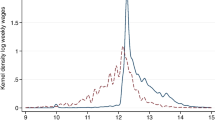Abstract.
Recent years have witnessed a large inflow of illegal immigrants into Greece. Past surveys have examined the extent and nature of this immigration, but have not analysed the impacts on the economy. This paper presents a theoretical and empirical analysis of the impact of illegal immigration on the economy of the small open type, like that of Greece. The theoretical analysis uses a small stylised model to show that there is no unequivocal case for illegal immigration to lead to declines in the real wages of unskilled labour and increases in the real wages of skilled. Empirical analysis using a recently constructed applied general equilibrium model for Greece, adapted to the purpose in hand, shows that the inflow of illegal immigrants has resulted in declines of the real disposable incomes of two classes of households among the fifteen modelled, namely those headed by an unskilled person, that are poor and middle income. All other households gain. The ones who lose, however, make up about 37% of the Greek population. The distributional effects are moderated, however, when rigidities in the labour market are simulated.
Similar content being viewed by others
Author information
Authors and Affiliations
Additional information
Received: 16 May 1997/Accepted: 18 March 1998
Rights and permissions
About this article
Cite this article
Sarris, A., Zografakis, S. A computable general equilibrium assessment of the impact of illegal immigration on the Greek economy. J Popul Econ 12, 155–182 (1999). https://doi.org/10.1007/s001480050095
Issue Date:
DOI: https://doi.org/10.1007/s001480050095




